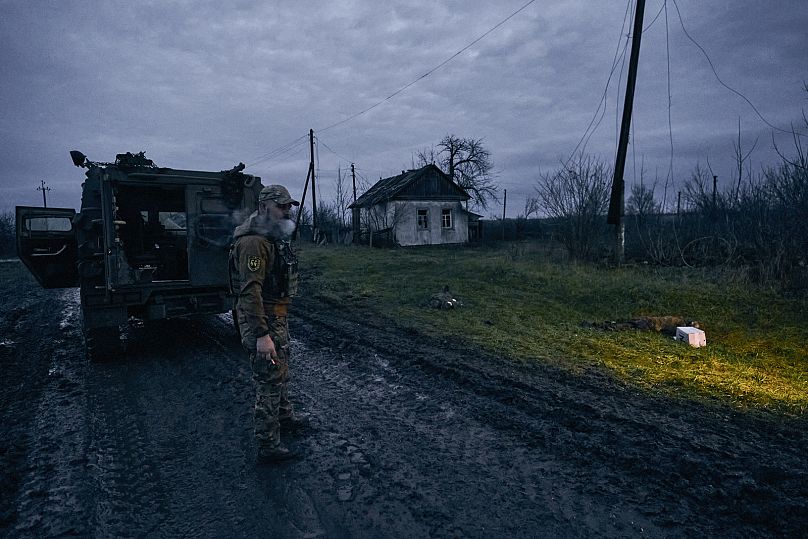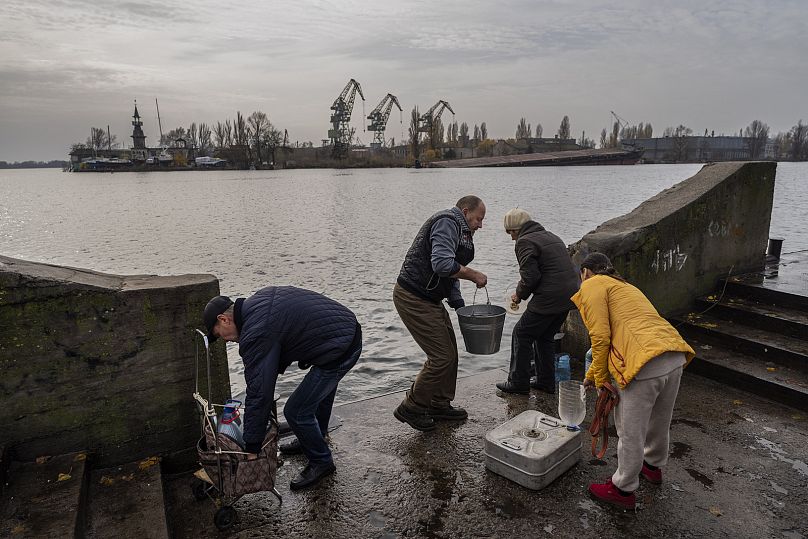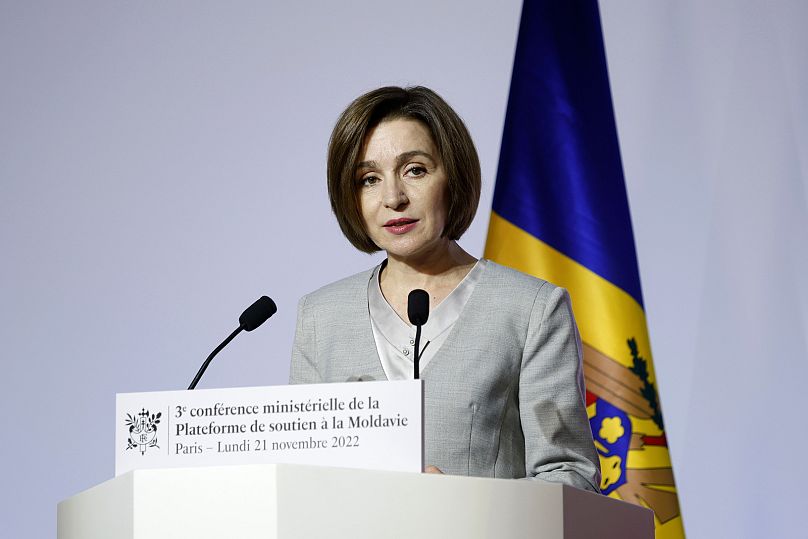Ukraine war: 'Torture' sites discovered in Kherson, nuclear plant faces 'close call'
1. Four Russian ‘torture’ sites discovered in Kherson, says Ukraine
Ukrainian prosecutors say they have discovered four Russian "torture sites" in the southern city of Kherson.
The "temporary detention centres" were discovered in four buildings that the Russian forces had allegedly used during its occupation of the city.
"During the capture of the city, the occupants illegally detained people and brutally tortured them," the Ukrainian prosecutor's office said on Telegram.
"Parts of rubber batons, a wooden bat, a device used by the Russians to torture civilians with electric shocks, an incandescent lamp, and bullets from the walls were recovered."
"People in cells and basements were subjected to various methods of torture, physical and psychological violence," it added.
Ukrainian forces recaptured Kherson earlier this month after Russia withdrew its forces and moved some of them to reinforce positions in the eastern Donetsk and Luhansk regions.
Kyiv has repeatedly accused Moscow of committing "war crimes" and "atrocities" since its invasion on February 24. Russia has denied the allegations.
Russia has meanwhile vowed to punish those responsible for the deaths of a group of Russian soldiers in Ukraine.
Videos emerged last week on Russian social media of 10 soldiers lying on the ground before a man seemingly opens fire.
Moscow claims that the men were prisoners of war who had been trying to surrender to Kyiv before they were "brutally" killed.
"Naturally Russia will search for those who committed this crime itself, they must be found and punished," Russian presidential spokesman Dmitry Peskov told reporters on Monday.
Peskov added that Moscow would turn to international bodies for help, "if it can be useful".
The UN’s Human Rights Monitoring Mission in Ukraine has also called for further probe. Ukraine’s deputy prime minister says the country will investigate the video footage.
In his daily address on Sunday, Ukrainian President Volodymyr Zelenskyy said nearly 400 Russian attacks had taken place in the east of the country in the last 24 hours.
"The fiercest battles, as before, are in the Donetsk region. Although there were fewer attacks today due to worsening weather, the amount of Russian shelling, unfortunately, remains extremely high," Zelenskyy said.
"In the Luhansk region, we are slowly moving forward while fighting. As of now, there have been almost 400 artillery attacks in the east since the start of the day," he added.
2. Nuclear plant came 'close' to disaster, UN warns
Ukraine nearly faced a nuclear disaster after the Zaporizhzhia power plant -- Europe's largest -- was showered with a barrage of shells.
Some of the missiles fell near reactors and damaged a radioactive waste storage building, the UN's International Atomic and Energy Agency (IAEA) reported.
Kyiv and Moscow on Monday traded blame for at least a dozen explosions at Ukraine's Zaporizhzhia nuclear power station, which lies under Russian control since shortly after the invasion. It still lies across the Dnipro river from areas controlled by Ukraine.
The UN nuclear watchdog's director general, Rafael Grossi, said that the perpetrator of the attacks was taking "huge risks and gambling with many people's lives". Nevertheless, news agencies like Reuters have been unable to verify which side is responsible.
Among other targets of the shelling are a cooling pond, a cable to one reactor and a bridge to another, according to the IAEA.
"We were fortunate a potentially serious nuclear incident did not happen. Next time, we may not be so lucky," Grossi said in a statement late on Sunday, describing the situation as a "close call".
"We are talking metres, not kilometres," he said.
Repeated shelling of the Zaporizhzhia plant throughout the conflict has heightened fears about a potential disaster a mere 500 kilometres from the location of the world's worst nuclear accident -- Chornobyl, whose reactor exploded in 1986.
3. Zelenskyy asks NATO for protection against Russian 'nuclear sabotage'
Volodymyr Zelenskyy called on NATO members to guarantee protection from "Russian sabotage" at nuclear facilities.
"All our nations are interested in not having any dangerous incidents at our nuclear facilities," he said in a video address to NATO's Parliamentary Assembly in Madrid.
Describing Russia as a "terrorist state", he added that "we all need guaranteed protection from Russian sabotage at nuclear facilities."
The Ukrainian President also urged for new EU sanctions against Russia, decrying its "policy of genocide", despite Moscow's denial of committing deliberate attacks on civilians.
Ukraine's nuclear energy firm Energoatom has blamed Russia for shelling's Zaporizhzhia plant, while further accusing it of "endangering the whole world" with nuclear blackmail.
Russia's defence ministry, on the contrary, has accused Ukraine of firing at power lines supplying the nuclear facility. The head of the country's state-run nuclear energy agency, Rosatom, said it had discussed Sunday's shelling with the IAEA, deeming there to be the danger of a possible nuclear incident.
4. Ukraine evacuates civilians from liberated regions, fearing winter shortages
Ukraine is evacuating residents from the newly liberated sections of southern regions, Kherson and Mykolaiv, following blackouts on Monday.
Authorities urged the civilians to move to safer areas in the central and western parts of the country, Ukrainian Deputy Prime Minister Iryna Vereshchuk said, following concerns that sustained Russian shelling will cause energy and water shortages, making conditions unliveable this winter.
Vereshcuk added that the government would provide transportation, accommodations and medical care.
The evacuations are taking place over a week after Ukraine recaptured the city of Kherson, on the western bank of the Dnipro river, and surrounding areas in a major battlefield gain.
Since then, residents and authorities alike are realising the extent of the Russian forces' damage to power and other infrastructure prior to their retreat.
Ukraine's winters are known to be particularly harsh, and snow has already covered Kyiv, the capital, and other parts of the country. In Kherson itself, the mean temperature descends below 0°C come January.
5. Paris aid conference pledges 'assistance' to Ukraine's beleaguered neighbour Moldova
An international aid conference in Paris on Monday has announced its aim to provide "concrete and immediate assistance" to Moldova, Europe's most impoverished state, France's Foreign Ministry has said.
The East European country, that shares a border with Ukraine, has been afflicted by widespread blackouts, heavy refugee flows and potential security threats from the neighbouring war.
Last week, half a dozen Moldovan cities were left without electricity as the country's Soviet-era energy systems -- which are connected to Ukraine -- were affected by the heavy Russian shelling of Ukrainian infrastructure targets.
"This international support is all the more important as Moldova is currently facing an unprecedented energy crisis which, with the approach of winter, poses a risk of a humanitarian crisis for the Moldovan population," the ministry said.
Nicu Popescu, Moldova’s foreign minister and minister for European integration, said at the conference on Monday that "the objective of today is to continue moving forward with ensuring peace, stability in our part of Europe."
“Ukraine is facing this brutal Russian aggression but this aggression is posing a problem for everyone in Europe and that of course applies (to) Moldova,” he added. "Moldova is severely affected by this war economically, when it comes to the security of energy supplies."
Two previous conferences for Moldova earlier this year raised hundreds of millions of euros, but its needs are growing as the war rages on.














